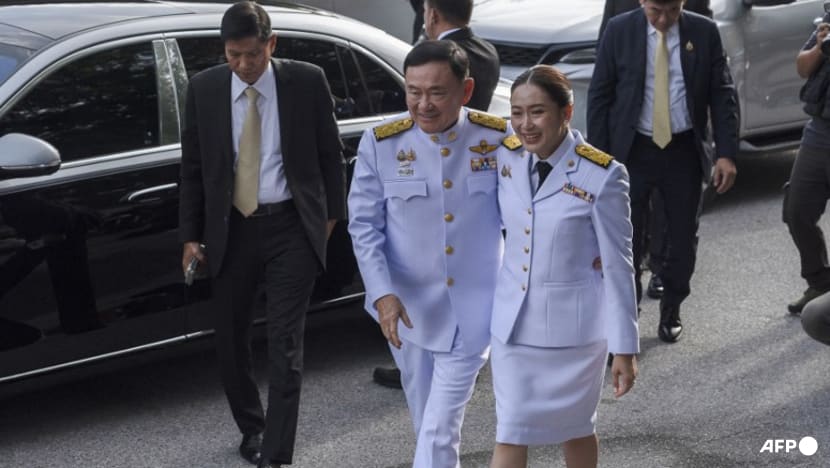Commentary: New Thai PM Paetongtarn Shinawatra has a clear-eyed view of the risks she faces from day one
It would be simplistic to conclude that Thailand’s new prime minister is fated to fall by the hand of the military like her father Thaksin Shinawatra, says Control Risks’ Harrison Cheng.

Thailand's new Prime Minister Paetongtarn Shinawatra arrives with her father Thaksin Shinawatra for the royal endorsement ceremony officially appointing her as the new prime minister, in Bangkok on Aug 18, 2024. (Photo: AFP/Chanakarn Laosarakham)

This audio is generated by an AI tool.
SINGAPORE: Sunday (Aug 18) was the perfect day for father-daughter bonding. Paetongtarn Shinawatra, the 37-year-old head of the Pheu Thai party, received royal endorsement to become Thailand’s youngest prime minister. On the same day, Thaksin Shinawatra - her father, former prime minister and the de facto power behind Pheu Thai - ended his parole with a royal pardon.
In her first press conference as prime minister, Ms Paetongtarn declared her intention to avoid the fate that had befallen three predecessors from the Shinawatra clan: Thaksin, her uncle-in-law Somchai Wongsawat, and her aunt Yingluck Shinawatra. Thaksin’s premiership had been cut short by the 2006 military coup, while the Constitutional Court played a central role in ousting Somchai and Yingluck’s governments in 2008 and 2014 respectively.
Ms Paetongtarn’s statement was a clear-eyed view - and an open admission - of the risks facing her administration from day one.
BRINGING ON THE CHARM
Whether Ms Paetongtarn will survive in office until the next general election, due by 2027, is another matter altogether.
She inherits significant economic and political challenges from her short-lived predecessor, Srettha Thavisin. Economic growth remains sluggish, while Pheu Thai’s flagship economic stimulus programme - the digital wallet handout scheme - continues to be controversial in terms of its fiscal sustainability and effectiveness.
Mr Srettha’s own ouster at the hands of the Constitutional Court just last week underscores the determination of hardline conservatives to retaliate against attempts by Thaksin to more directly influence government decision-making.
Moreover, Ms Paetongtarn carries the unique baggage of being a Shinawatra family member. While few doubted that Thaksin was always in the picture when Mr Srettha was prime minister, the latter could at least fall back on his track record as a businessperson to defend the objectivity of his views.
Ms Paetongtarn, who has made no effort to disguise her readiness to seek her father’s advice in governing, will be given even less benefit of the doubt than Mr Srettha ever was.
And perhaps this is a clue to how she will seek to navigate tensions with the hardline conservative camp for the remainder of her tenure, however long or short it ends up being. No prime minister from Pheu Thai can hope to escape the long shadow of its patriarch, let alone his flesh and blood. So why try?
If the fledgling days of Ms Paetongtarn’s political career - she was introduced as a face of Pheu Thai only in early 2022 - are any indication, she is likely to stage a charm offensive aimed at the military and conservative elites who have spent the past two decades baying for Thaksin’s blood.
It is a fitting assignment, given her vice chairmanship of the National Soft Power Strategy Committee. Her youth and her humble persona will be key tools in her arsenal going forth, as Thaksin himself has pointed out.
THE LONG ARM OF THE LAW
The idea of a charm offensive directed at the conservative elites is hardly novel.
Ms Paetongtarn’s aunt Yingluck trod the same path more than a decade ago when she stepped out of her comfort zone as a businesswoman and into the gnarly affairs of government. Ultimately, the military chief with whom she seemingly got on so well ended up ousting her government from power and taking charge of the country for nearly a decade.
It would be simplistic to conclude that Ms Paetongtarn is fated to fall by the hand of the military.
One can argue that the conditions have changed. The Yingluck government was overthrown for trying to pass an amnesty Bill to bring Thaksin home; Thaksin is now a free man in Thailand. The yellow-shirt protestors who led mass anti-government movements in 2013 and 2014 are no longer the tempestuous force they once were.

Nevertheless, while Ms Paetongtarn may be less likely to stare down the barrel of a tank if it comes to crisis point, the truth is that the military may not need to resort to its armoury if it wants her gone. It is far easier to deflect international criticism of a “judicial coup”, with the Constitutional Court seen to preserve conservative interests by removing threats from popular political parties to provocative premiers.
A silver lining for Thailand is that Ms Paetongtarn appears cognisant of the need to steer clear of obvious legal controversies, and by extension the long arm of the Constitutional Court.
The absence of some controversial figures in Mr Srettha’s former Cabinet at her swearing-in ceremony suggests an intent on her part to pick her battles carefully on the road ahead. She will also surely be closely scrutinising her ministerial candidates.
POLICY CONTINUITY AND CHANGE
Contrary to her blanket statement on Sunday that she will continue with all of Mr Srettha’s policies, indications are that the new prime minister will review the digital wallet scheme to ensure that it is less vulnerable to complaints by state institutions.
Reports suggesting that caretaker finance minister Pichai Chunhavajira could be left out of the new Cabinet will add to the uncertainty about the future of the scheme. Thailand may have to wait even longer for a stimulus to domestic spending.
Pheu Thai’s push for casino legalisation is also up in the air. The Bhumjaithai Party - with increased clout as the second-largest party within the ruling coalition - had initially backed the plan but recently announced its opposition to the Bill.
To get it passed, Ms Paetongtarn may have to deliver more concessions to appease Bhumjaithai leader and Deputy Prime Minister Anutin Charnvirakul as a quid pro quo, such as on Pheu Thai’s proposal to reclassify cannabis as a narcotic just two years after decriminalising it.
On other strategic sectors such as the digital economy, next-generation automotives and renewables, investors will need to wait to see the new Cabinet picks.
In comments made after she was royally endorsed, Ms Paetongtarn said that she intended to perform her duty to the best of her ability. Whether she remains in charge when 2027 comes along depends on which duty she deems higher: That to the people of Thailand, or to her father.
Harrison Cheng is a Director in risk consultancy firm Control Risks.

















